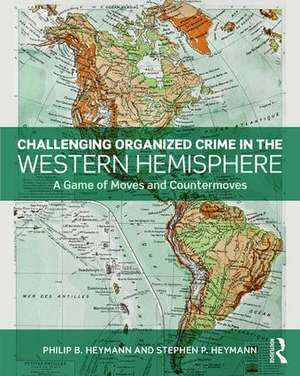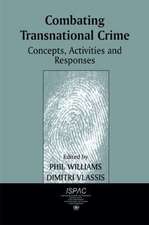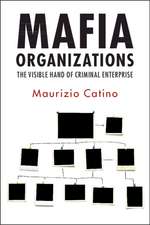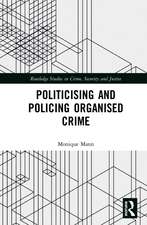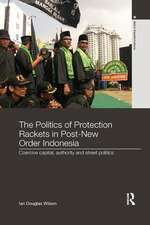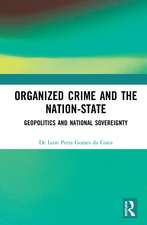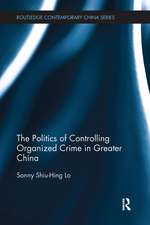Challenging Organized Crime in the Western Hemisphere: A Game of Moves and Countermoves
Autor Philip B. Heymann, Stephen P. Heymannen Limba Engleză Paperback – 3 iul 2018
While most texts describe organized crime groups and the challenges to government they impose from a static perspective, the authors dissect the interaction over time of organized crime and democratic governance that has created the present structure and balance of advantages in the United States. Readers learn about the markets for contraband and extortionate protection that form the bulk of organized criminal enterprise, the vulnerabilities of the traditional practices and rules of law enforcement, the effects of globalization of criminal enterprises on their contest with the state, the effectiveness of various practices of law enforcement, and the continuing forces of change, often technological, in the businesses of organized crime and law enforcement that play important roles in the contest between them.
This thought- provoking book is ideal for students of organized and transnational crime in university programs and law schools, as well as researchers and legal practitioners, who seek to look beyond the simple traditional history of organized crime and develop a strategy to confront organized crime in the future.
| Toate formatele și edițiile | Preț | Express |
|---|---|---|
| Paperback (1) | 321.20 lei 6-8 săpt. | |
| Taylor & Francis – 3 iul 2018 | 321.20 lei 6-8 săpt. | |
| Hardback (1) | 875.55 lei 6-8 săpt. | |
| Taylor & Francis – 20 iun 2018 | 875.55 lei 6-8 săpt. |
Preț: 321.20 lei
Preț vechi: 415.24 lei
-23% Nou
Puncte Express: 482
Preț estimativ în valută:
61.47€ • 66.75$ • 51.63£
61.47€ • 66.75$ • 51.63£
Carte tipărită la comandă
Livrare economică 22 aprilie-06 mai
Preluare comenzi: 021 569.72.76
Specificații
ISBN-13: 9781138595361
ISBN-10: 1138595365
Pagini: 148
Ilustrații: 2 Line drawings, black and white; 2 Illustrations, black and white
Dimensiuni: 191 x 235 x 13 mm
Greutate: 0.29 kg
Ediția:1
Editura: Taylor & Francis
Colecția Routledge
Locul publicării:Oxford, United Kingdom
ISBN-10: 1138595365
Pagini: 148
Ilustrații: 2 Line drawings, black and white; 2 Illustrations, black and white
Dimensiuni: 191 x 235 x 13 mm
Greutate: 0.29 kg
Ediția:1
Editura: Taylor & Francis
Colecția Routledge
Locul publicării:Oxford, United Kingdom
Public țintă
Postgraduate and UndergraduateCuprins
Prologue
Acknowledgements
Part One: The Business of Organized Crime: The Concerns of States
1. What is Organized Crime?
2. The Sinaloa Cartel as a Concrete Example
3. Strategies For a State Addressing Organized Crime
4. A Final Issue of State Strategy: Rules of War or Law Enforcement.
5. Detecting Visible Indications of Organized Crime
Part Two: Law Enforcement on Steroids
6. The Mechanisms and Difficulties of Traditional Law Enforcement in Addressing Organized Crime
7. Creating a Law Enforcement Capacity to Address the Advantage of Organized Crime
8. New Strategies for Prosecutors of Organized Crime
9. A Double-Edged Sword: How Improved Law Enforcement Aided Whitey Bulger
Part Three: Globalization
10. Going International
11. International Law Enforcement Cooperation Pursuant to Treaties
12. The Colombian Connection: A Truly Cooperative Solution for an International Problem
13. Two Critical Ingredients of International Cooperation
Part Four: Moving the Proceeds of Organized Crime in Secret
14. Moving Proceeds of Crime without Revealing Their History
15. The Limited Effectiveness of a Barrage of Prohibitions of Money Laundering
Part Five: The Future of Organized Crime
16. The Internet and the Exploitation of the “Fog of War”
17. Conclusion: Predicting the Future of the Contest Between Nations and Sizable Criminal Enterprises
Bibliography
Index
Acknowledgements
Part One: The Business of Organized Crime: The Concerns of States
1. What is Organized Crime?
2. The Sinaloa Cartel as a Concrete Example
3. Strategies For a State Addressing Organized Crime
4. A Final Issue of State Strategy: Rules of War or Law Enforcement.
5. Detecting Visible Indications of Organized Crime
Part Two: Law Enforcement on Steroids
6. The Mechanisms and Difficulties of Traditional Law Enforcement in Addressing Organized Crime
7. Creating a Law Enforcement Capacity to Address the Advantage of Organized Crime
8. New Strategies for Prosecutors of Organized Crime
9. A Double-Edged Sword: How Improved Law Enforcement Aided Whitey Bulger
Part Three: Globalization
10. Going International
11. International Law Enforcement Cooperation Pursuant to Treaties
12. The Colombian Connection: A Truly Cooperative Solution for an International Problem
13. Two Critical Ingredients of International Cooperation
Part Four: Moving the Proceeds of Organized Crime in Secret
14. Moving Proceeds of Crime without Revealing Their History
15. The Limited Effectiveness of a Barrage of Prohibitions of Money Laundering
Part Five: The Future of Organized Crime
16. The Internet and the Exploitation of the “Fog of War”
17. Conclusion: Predicting the Future of the Contest Between Nations and Sizable Criminal Enterprises
Bibliography
Index
Notă biografică
Philip Benjamin Heymann is the James Barr Ames Professor of Law Emeritus at the Harvard Law School. After graduation from Harvard Law School he clerked for U.S. Supreme Court Justice John Marshall Harlan. At the U.S. Department of Justice he was then Assistant to the Solicitor General (1961-1965), Assistant U.S. Attorney General in charge of the Criminal Division (1978-81) and Deputy Attorney General (1993-94). At the U.S. Department of State (1965-1969), he was Acting Administrator of the Bureau of Security and Consular Affairs, Deputy Assistant Secretary of State for the Bureau of International Organizations and Executive Assistant to the Undersecretary of State.
Among the number of articles and books he has written while teaching at Harvard Law School, Heymann is the author of four books on combating terrorism: Terrorism and America (MIT Press 2000); Terrorism, Freedom, and Security (MIT Press 2003); Protecting Liberty in an Age of Terror with co-author Juliette Kayyem (MIT Press 2005); Laws, Outlaws, and Terrorists (with co-author Gabriella Blum (MIT Press 2010). He is also the author of the Politics of Public Management (Yale University 1987) and Living the Policy Process (Oxford University Press 2008).
Stephen Philip Heymann’s career as a federal prosecutor spanned over 33 years. During that time, he received commendations for his work from the Director of the FBI, the General Counsel for the Navy, the Director of the Secret Service and the Director of the Executive Office of U.S. Attorneys. He is the recipient of the Attorney General’s Distinguished Service Award.
During his career, Stephen Heymann was a member of the Justice Department’s elite Organized Crime Strike Force; established and directed one of the country’s first, dedicated cybercrime units and was Deputy Chief of the Criminal Division of the U.S. Attorney’s Office in Boston, where he advised on all aspects of investigation and case structuring. Among his significant cases, he led what the FBI then described as one of the most significant Asian Organized Crime cases in its war against non-traditional organized crime; conducted the first court-authorized wiretap of a computer network, resulting in identification and charging of a foreign national breaking into U.S. military systems from Argentina; and successfully investigated a transnational group engaged in stealing tens of millions of credit and debit cards from TJX and other major US retailers. The last was described by the Attorney General of the United States as the largest and most complex identity theft case then brought in the country.
Among the number of articles and books he has written while teaching at Harvard Law School, Heymann is the author of four books on combating terrorism: Terrorism and America (MIT Press 2000); Terrorism, Freedom, and Security (MIT Press 2003); Protecting Liberty in an Age of Terror with co-author Juliette Kayyem (MIT Press 2005); Laws, Outlaws, and Terrorists (with co-author Gabriella Blum (MIT Press 2010). He is also the author of the Politics of Public Management (Yale University 1987) and Living the Policy Process (Oxford University Press 2008).
Stephen Philip Heymann’s career as a federal prosecutor spanned over 33 years. During that time, he received commendations for his work from the Director of the FBI, the General Counsel for the Navy, the Director of the Secret Service and the Director of the Executive Office of U.S. Attorneys. He is the recipient of the Attorney General’s Distinguished Service Award.
During his career, Stephen Heymann was a member of the Justice Department’s elite Organized Crime Strike Force; established and directed one of the country’s first, dedicated cybercrime units and was Deputy Chief of the Criminal Division of the U.S. Attorney’s Office in Boston, where he advised on all aspects of investigation and case structuring. Among his significant cases, he led what the FBI then described as one of the most significant Asian Organized Crime cases in its war against non-traditional organized crime; conducted the first court-authorized wiretap of a computer network, resulting in identification and charging of a foreign national breaking into U.S. military systems from Argentina; and successfully investigated a transnational group engaged in stealing tens of millions of credit and debit cards from TJX and other major US retailers. The last was described by the Attorney General of the United States as the largest and most complex identity theft case then brought in the country.
Descriere
Challenging Organized Crime in the Western Hemisphere: A Game of Moves and Countermoves takes the unusual approach of exploring and describing how organized crime groups develop their capacities in response to heightened powers of law enforcement; and how law enforcement in turn responds, creating an ongoing dynamic interaction. This thought-provoking book is ideal for students of organized and transnational crime in university programs and law schools as well as researchers and legal practitioners who seek to look beyond the simple traditional history of organized crime and develop a strategy to confront organized crime in the future.
